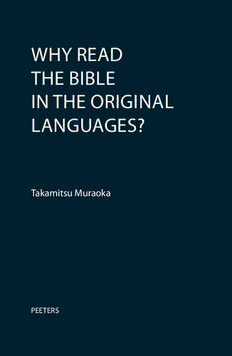Table Of ContentWHY READ
THE BIBLE
IN THE ORIGINAL
LANGUAGES?
Takamitsu Muraoka
PEETERS
WHY READ THE BIBLE IN THE ORIGINAL LANGUAGES?
WHY READ
THE BIBLE
IN THE ORIGINAL
LANGUAGES?
Takamitsu Muraoka
Peeters
Leuven – Paris – Bristol, CT
2020
A catalogue record for this book is available from the Library of Congress.
© 2020 – Peeters – Bondgenotenlaan 153 – B-3000 Leuven – Belgium
D/2020/0602/55
ISBN 978-90-429-4200-4
eISBN 978-90-429-4201-1
All rights reserved. No part of this book may be reproduced, stored in a retrieval
system, or transmitted in any form or by any means, electronic, mechanical, photo-
copying, recording, or otherwise, without the prior permission of the publisher.
T C
ABLE OF ONTENTS
Foreword 7
My curriculum vitae of a sort 9
Introduction 15
Chapter I: Hebrew 23
1) “She thus became pregnant for his best interests” (Gn 38.18) 23
2) Abraham being tested (Gn 22.1-19) 25
3) “What’s your name?” (Gn 32) 31
4) “To increase”: intransitive and transitive (Gn 35.11, 48.4) 33
5) Two genders (Ct 1.15-16) 35
6) David and Bathsheba (2Sm 11-13) 36
7) Finale: Part I (2Sm 12.1-25) 42
8) Finale: Part II, “Like father, like son” (2Sm 13.1-39) 53
Chapter II: Greek 69
A) Personal pronouns 69
B) The definite article 70
C) Past, present, future 72
1) A sinful woman (Lk 7.36-50) 72
Chapter III: Aramaic 79
A) Singular and plural 81
B) Language and culture 84
C) Jeursalem 85
Chapter IV: Septuagint as a bridge between the Old and the New
Testaments 87
A) “In the beginning God made heaven and earth” (Gn 1.1) 89
B) Love comes in more than one form 89
6 TABLE OF CONTENTS
C) Biblical love as understood by a 19th century Japanese politician cum
soldier 92
D) Wash feet 94
E) The Septuagint in relation to the New Testament 100
In conclusion 107
Indices 109
A) Biblical texts 109
B) Hebrew, Aramaic, and Greek words 111
F
OREWORD
This is a collection of short essays which purport to show that, by reading the
Bible in its original languages, namely Hebrew, Aramaic, and Greek, it can be
interpreted and analysed better or differently than when it is read in this or that
modern translation. This book is meant for the average reader, believer or not,
not necessarily competent in any of the three languages. Since, however, I am
going to present here some thoughts that occurred to me over my nearly sixty
years’ occupation with these languages, I would hope that advanced specialists
might also find a thing or two of interest in my remarks and analysis of some
biblical texts chosen to demonstrate my position.
M
Y CURRICULUM VITAE OF A SORT
When I was a pupil at a junior high-school in a small village in Kyushu, the
southern island of Japan, math and English were my favourite subjects. I found
the pace of English teaching irritatingly slow. By the end of the second semester
in the first year I had got to the end of the textbook with my own bat. There was
no library in the school nor in the village, no bookshop, either. There was no
English course available on the radio in those days. I went to a general store where
textbooks were on sale, no other books, and bought textbooks meant for higher
grades. Having finished them in due course, I found at my uncle’s an English
textbook he had used at his pre-war high-school, and studied it with unquenchable
zeal. When I moved on to a senior high-school in Ohkuchi, an hour’s train journey
away, it did have a decent library, in which I was overjoyed to find plenty of
English books other than the textbooks. Moreover, an American Baptist mission-
ary held an English Bible class every Sunday in the city. Taking up my English
teacher’s advice I started visiting it in order to improve my practical skills in
spoken English. What I gained there was not only the practical knowledge of
English, but also the knowledge of God. At home I learned virtually nothing of
religion. My family was not atheist, but laid no particular emphasis on religious
beliefs, of whatever variety. Through the missionary, the late Rev. Vernon Chan-
dler, I got to know the God of the Bible as revealed by Jesus Christ. As a univer-
sity freshman I was privileged to undergo an authentic baptism, immersion in a
water reservoir in Ohkuchi. My father, whose career as a professional officer of
the Imperial Japanese Army came to a miserable end with Japan’s defeat in 1945,
dreamed of his only and eldest son making a splendid career in his stead as a
diplomat or a top public servant. He thought it very advantageous and sensible for
me to study in the law school of Tokyo University. I, however, was adamant in
my wish to major in English at Tokyo Kyoiku University with a view to becom-
ing an English teacher, having as a Christian at my heart the best interests of
pupils in a forlorn island somewhere off the mainland Japan.
At Tokyo Kyoiku University I came to know the late Prof. Masao Sekine, a
creative Old Testament scholar already well known overseas. In the department of
linguistics he was teaching Greek and Hebrew. Being very desirous of taking his
courses as optional subjects, I sought an interview with him only to be told that he

